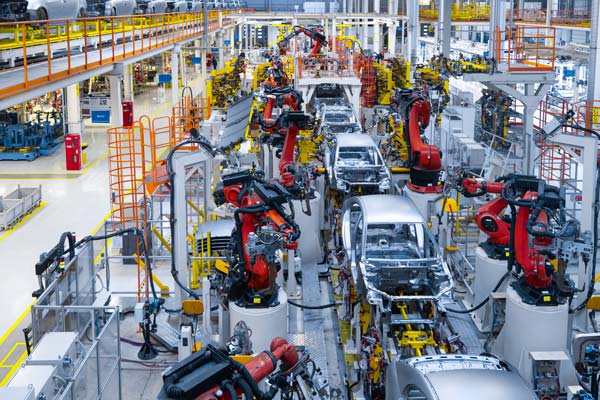In the fast-paced automotive industry, automation technologies are crucial for maintaining competitiveness and meeting high production demands. Programmable Logic Controllers (PLC) and Distributed Control Systems (DCS) are pivotal in streamlining manufacturing processes, enhancing quality control, and ensuring safety. This article explores how PLC and DCS are applied in the automotive sector, providing innovative solutions that drive efficiency and productivity.
The Role of PLC and DCS
Applications of PLC
PLCs are integral to automotive manufacturing, offering precision and flexibility in:
- Assembly Line Automation: PLCs control robotic arms, conveyors, and welding machines, ensuring seamless and efficient assembly operations.
- Quality Control: Real-time monitoring and adjustments improve product quality and reduce defects.
- Safety Systems: Implementing safety protocols to protect workers and equipment from hazards.
Applications of DCS
DCS is ideal for overseeing complex processes across large automotive plants:
- Centralized Process Control: Manages and coordinates various manufacturing processes from a unified platform.
- Data Integration and Analysis: Collects data from multiple sources for comprehensive analysis and decision-making.
- Process Optimization: Utilizes advanced algorithms to enhance production efficiency and reduce waste.
Solutions Offered by PLC and DCS
Enhancing Production Efficiency
PLC and DCS systems boost production efficiency through automation and data-driven insights:
- Automated Operations: Reduce manual interventions, leading to faster and more reliable production cycles.
- Real-Time Monitoring and Control: Continuous data collection and analysis optimize equipment performance and resource allocation.
Improving Quality Assurance
Quality is paramount in automotive manufacturing, and PLC and DCS contribute significantly:
- Defect Detection: Automated inspection systems identify defects early, minimizing rework and waste.
- Consistent Quality Standards: Ensure that every product meets stringent quality requirements through precise control mechanisms.
Ensuring Safety and Compliance
Safety and regulatory compliance are critical, with PLC and DCS providing robust solutions:
- Integrated Safety Protocols: Protect workers and equipment by implementing industry-standard safety measures.
- Compliance Monitoring: Ensure adherence to industry regulations and standards through automated reporting and documentation.
Implementation Case Study
Case Study: Automation Enhancement in a Leading Automotive Manufacturer
A prominent automotive manufacturer implemented PLC and DCS systems, achieving remarkable results:
- Increased Production Output: Streamlined processes reduced cycle times and increased throughput.
- Enhanced Product Quality: Real-time quality control systems reduced defects and improved overall quality.
- Improved Safety Standards: Safety systems effectively minimized workplace incidents and ensured regulatory compliance.
Conclusion
PLC and DCS provide essential solutions in the automotive industry, enhancing production efficiency, improving quality assurance, and ensuring safety. As technology continues to evolve, these systems will remain vital in driving innovation and competitiveness in automotive manufacturing. Automotive companies should embrace these technologies to achieve operational excellence and meet future challenges.
By integrating PLC and DCS solutions, the automotive industry can achieve greater efficiency, quality, and safety standards, paving the way for a more sustainable and competitive future.







